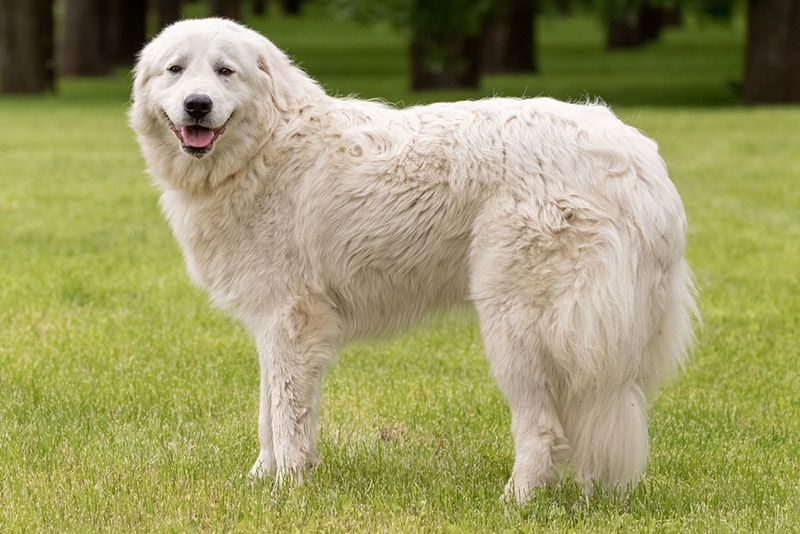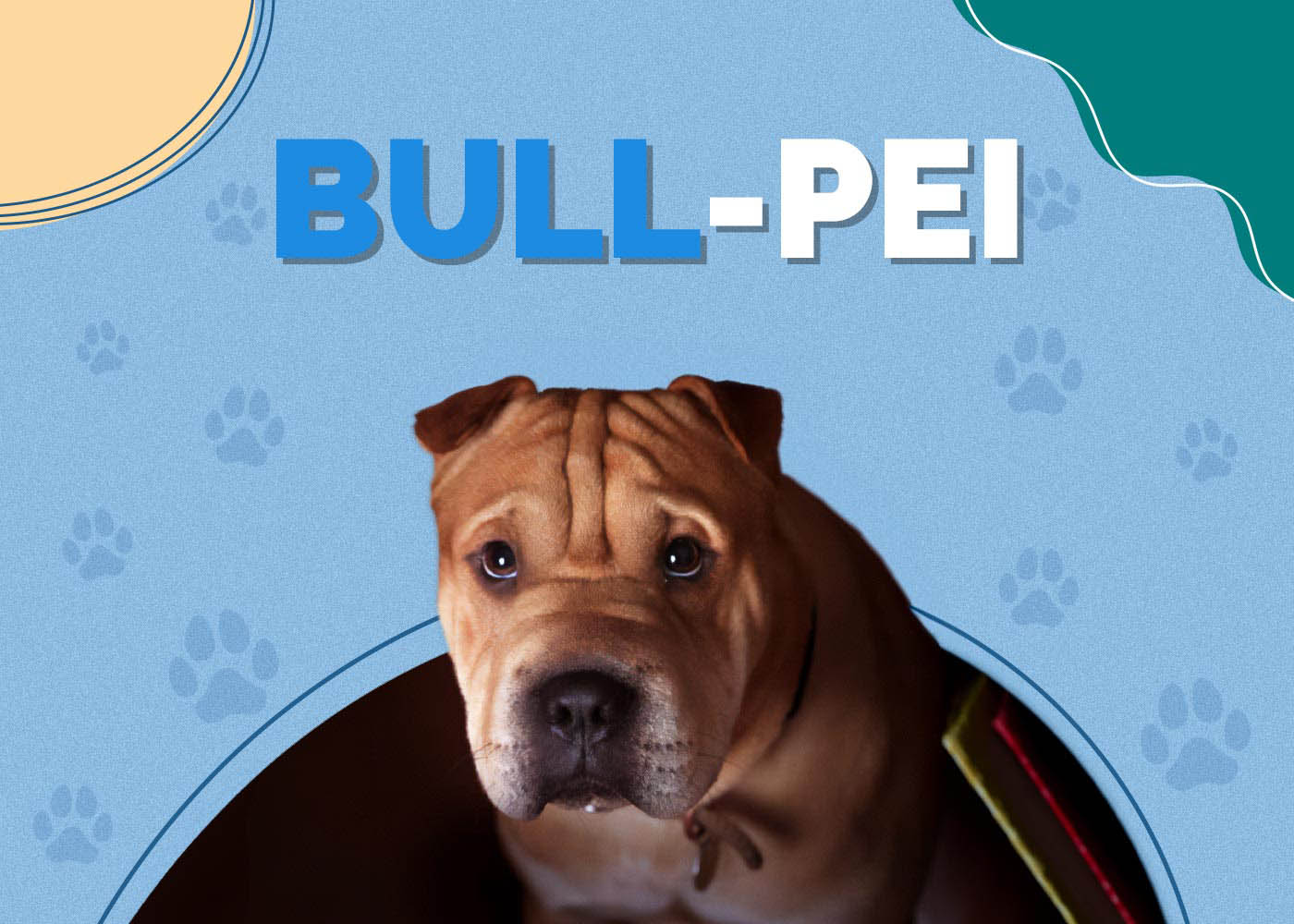Cavapoo Vs. Labradoodle: All the Differences (With Pictures)
Updated on
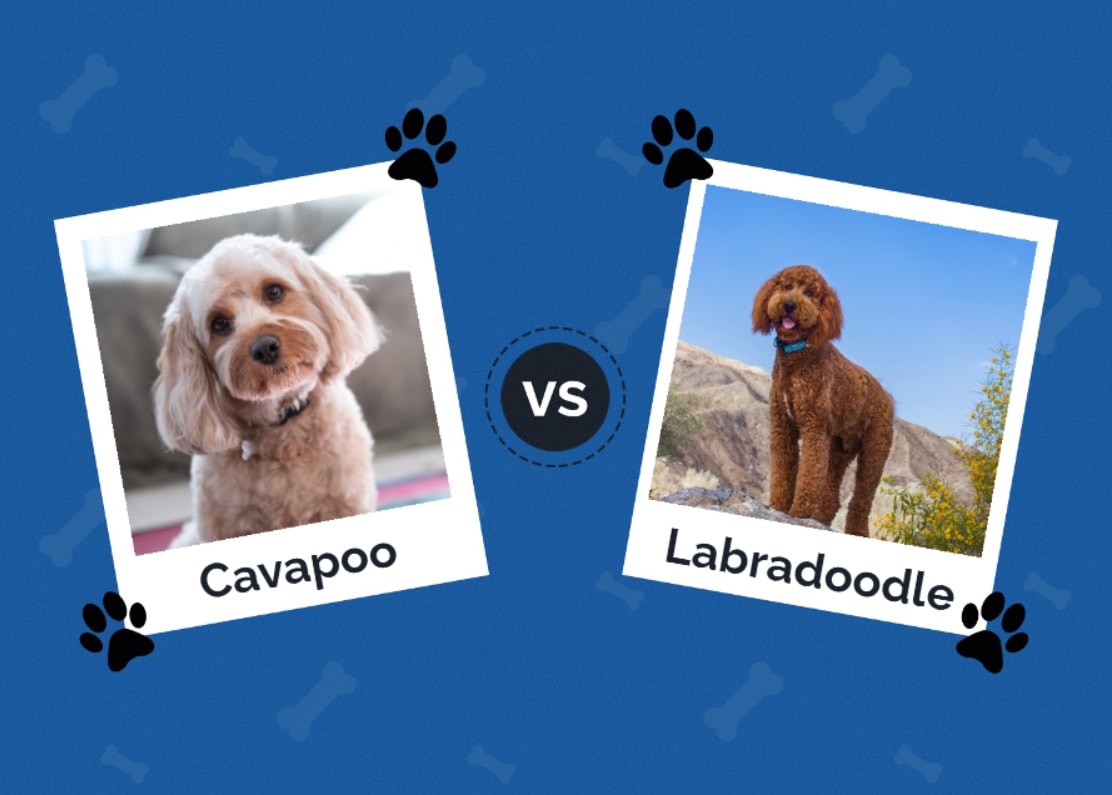
In today’s world, there are many options for adopting the ideal canine. There are purebreds, mixed breeds, and designer pups to choose from. The Cavapoo and Labradoodle are among the most popular designer dogs, but the trick is determining which is the best fit for you and your family.
You’re not alone if you’re torn between the Cavapoo and the Labradoodle. There are many similarities between the two and a few differences, which is why it’s so challenging for potential pet parents to make a choice.
We’re here to help by breaking down the similarities and differences between the two breeds, so you don’t have to. Once we’re done, hopefully, you can decide which is best for you and your family: the Cavapoo, the Labradoodle, or both.
Visual Differences
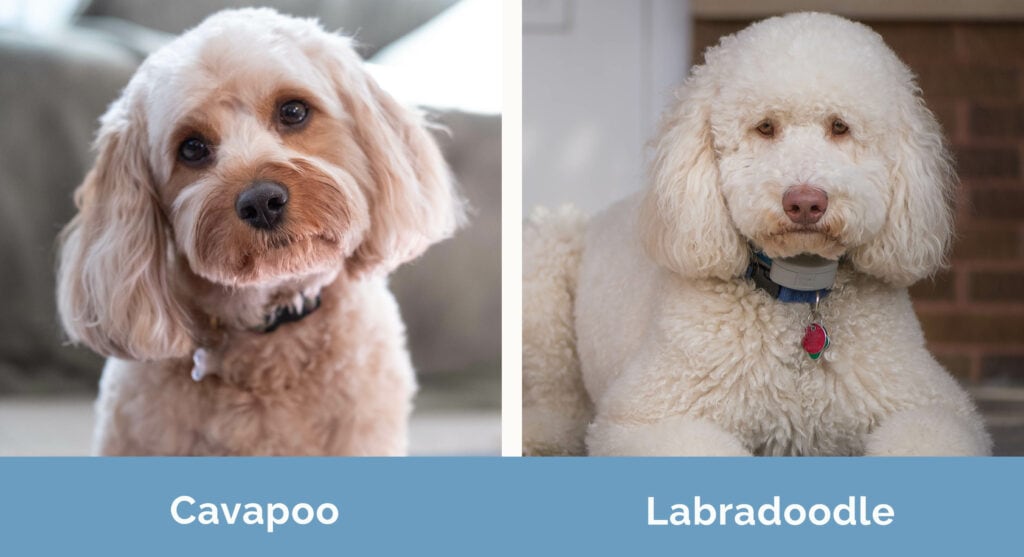
At a Glance
- Average height (adult): 9 to 14 inches
- Average weight (adult): 12 to 25 pounds
- Lifespan: 10 to 15 years
- Exercise: Daily walks
- Grooming needs: Moderate
- Family-friendly: Yes
- Other pet-friendly: Often
- Trainability: Intelligent, playful, outgoing, affectionate
- Average height (adult): 21 to 24 inches
- Average weight (adult): 50 to 65 pounds
- Lifespan: 12 to 14 years
- Exercise: 30 to 60 minutes a day
- Grooming needs: Moderate
- Family-friendly: Yes
- Other pet-friendly: Often
- Trainability: Intelligent, high energy, social, intelligent, eager to learn, alert, not overly protective
Cavapoo Overview
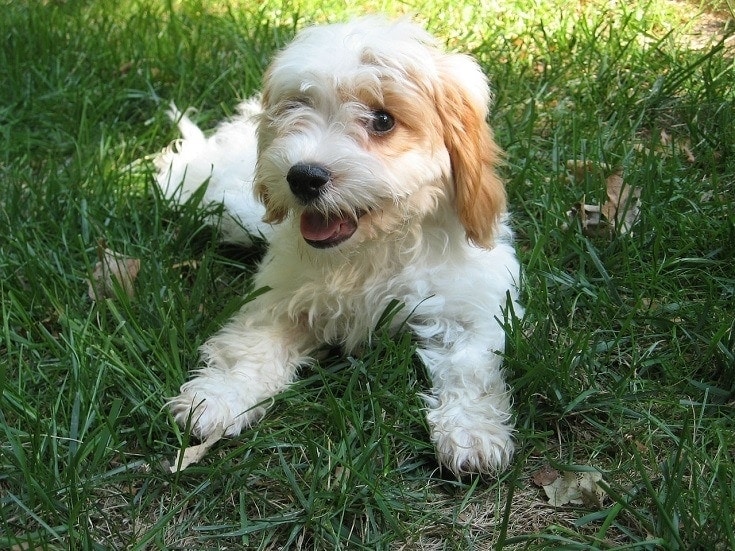
The Cavapoo is a cross between a purebred Cavalier King Charles Spaniel and a purebred Poodle. They are small-to-medium dogs that make great pets. They’re intelligent, outgoing, playful, loving, work well with children, and are pet friendly. We’ll discuss their personality, exercise needs, and any health issues you should watch out for with this adorable pup below.
Personality / Character
The Cavapoo is small, but they have a ton of personality to make up for it. They usually inherit the best qualities of their parents, meaning they are generally affectionate, social, and gentle. As with any dog, your Cavapoo will have its own personality but will also have the traits of its purebred parents.
They do have a few issues, however. These include being high-strung and suffering from separation anxiety if their owner is gone for long periods. It is an intelligent breed but also loves to be the focus of everyone’s attention. They are just as happy playing fetch as they are curled up on your lap watching TV.
The Cavapoo wasn’t bred to be a guard dog, and it’s affectionate towards strangers.
Exercise
Daily exercise is enough to keep this pup happy, from playing a game of fetch to a long walk after dinner. It’s recommended that you not take them out in the heat of the day, as their short muzzles make it hard for them to tolerate scorching, humid weather.
If you must take your Cavapoo out during the hottest part of the day, or the dog needs to be outside, keep plenty of fresh water available and provide shade for the dog to get away from the sun and heat.

Health & Care
Any dog you adopt will be prone to certain health issues, and the Cavapoo isn’t any different. The Cavapoo can inherit health issues from their parents, so it’s best to ask the breeder about the parents’ health history before purchasing a Cavapoo pup. Here are a few health issues to watch out for with this breed:
- Entropion
- Cataracts
- Skin problems
- Progressive retinal atrophy
- Epilepsy
- Patellar luxation
- Hip dysplasia
- Mitra valve dysplasia
The best way to catch these conditions early is to take your Cavapoo in for regular checkups.
Suitable for:
The Cavapoo is great for families with older children, couples, or individuals looking for a companion pet. Due to their small size, they don’t do as well with families with smaller children since they could be injured easily during play.
It’s not hard to socialize the Cavapoo to accept other animals in your home as they are very friendly and gentle. You have to be careful not to show more affection to other pets, so make sure to divide your attention equally among your animals.
Labradoodle Overview
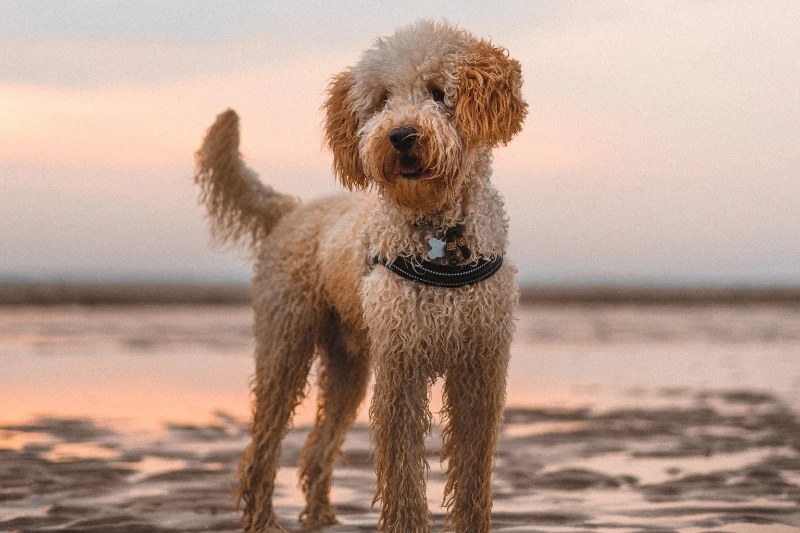
The Labradoodle is a mix between a Poodle and a Labrador Retriever. The result is a big lovable dog that any pet owner would be lucky to have. Labradoodles are often found in therapy and service work and are known for having hypoallergenic fur. However, even the Labradoodle isn’t 100% hypoallergenic.
Although the dog is adorable, loving, and intelligent, you’ll need to know more about the Labradoodle before purchasing one. We’ll go into the personality, exercise needs, and any health issues your Labradoodle might inherit from its parents below.
Personality / Character
The Labradoodle is a friendly, intelligent dog, which is why it does so well in therapy and service work. They are social and naturally energetic, so the dog needs someone who can control and train them to act as they should when overexcited.
If you train and socialize your Labradoodle as a puppy, the excitability can be easily managed. A Labradoodle that’s trained and socialized properly is mellow and friendly. A Labradoodle that isn’t trained and socialized properly can easily become anxious and unruly, which may cause problems with strangers and other dogs.
It’s important to mention that poor genetics can lead to behavioral issues and problems with temperament. While this is true for any dog breed, it’s been well-documented in the Labradoodle community, so make sure that you know the history of your Labradoodle puppy’s parents before you bring the dog home.
Exercise
It’s recommended that a healthy Labradoodle gets around 60 minutes of vigorous exercise a day. This is on top of two long walks a day.
If you live in an apartment, the Labradoodle probably isn’t the best dog for you, as they need space to run and exercise. If the dog doesn’t get enough exercise, you risk it becoming bored and destructive due to pent-up energy.
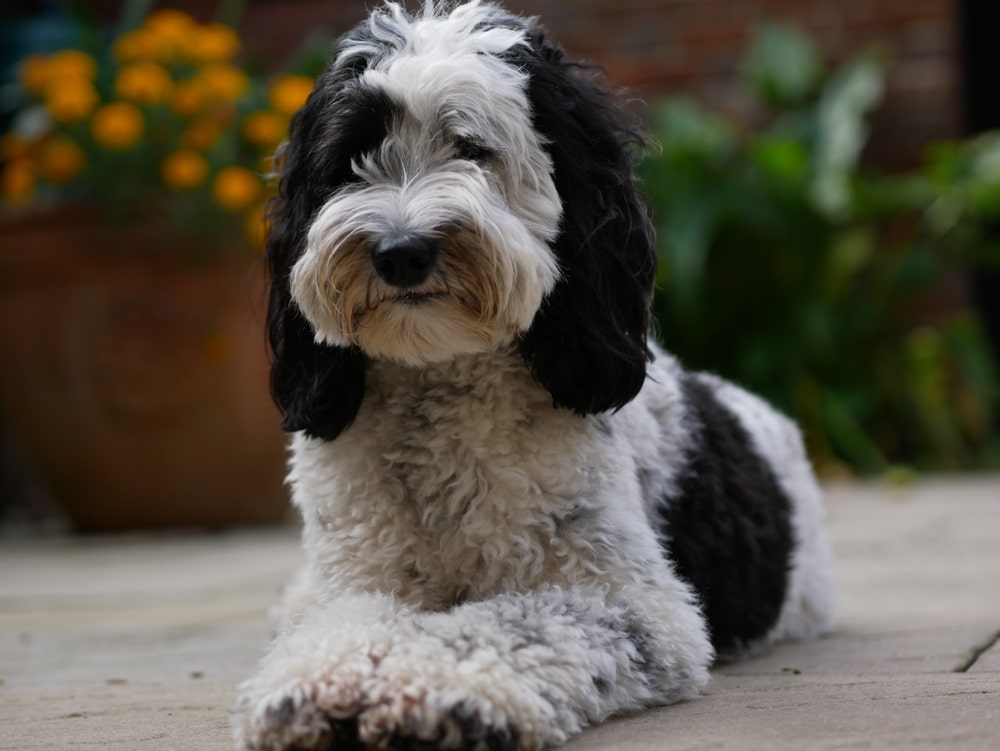
Health & Care
The Labradoodle can inherit some health issues from its parents.
- Ear infections
- Epilepsy
- Obesity
- Chronic allergies
- Sebaceous adenitis
- Progressive retinal atrophy
- Addison’s disease
- Hip dysplasia
- Elbow dysplasia
- Bloat
- Von Willebrand disease
- Exercise-induced collapse
If you see any signs indicating your Labradoodle is unwell, it’s essential to make an appointment with your vet. Make sure that you take your dog to the vet for regular checkups so they can catch these issues before they become significant problems.
Suitable for:
The Labradoodle makes a great family pet and is bursting with energy. However, it’s also important to note that depending on its Poodle parent’s size, it can be a large dog, so you must be careful around small children. Labradoodles are typically affectionate to strangers, so if you’re looking for protection, this isn’t the breed for you.
Since it has a low prey drive, the Labradoodle is the perfect dog to have around other pets, including other dogs. Of course, you need to socialize and train the dog to get along with other pets as a puppy for the best results.
Which Breed Is Right for You?
When choosing the right pet for your family, you’ll need to consider if your home is the ideal environment for the Labradoodle or Cavapoo. If you live in an apartment, the Labradoodle isn’t your best choice because they do need a lot of exercise, which means they are better suited to families with yards to run in.
The Cavapoo is small enough for apartment living and can stay healthy with play sessions and daily walks. Cavapoos are small, so it’s best not to have them around younger children. However, the Labradoodle is large and could easily harm a young child when playing. Without extensive training and socialization as puppies, Labradoodles aren’t the best dogs to play around small kids, either.
Both dogs are friendly, loving, and intelligent, and would love to have a forever home with you.
See also:
- Sheepadoodle vs Labradoodle: Which One Is Right for Me?
- Cavapoo vs Mini Goldendoodle: The Differences (With Pictures)
Featured Image Credit: (L) Steven B Gold, Shutterstock | (R) Danita Delimont, Shutterstock



